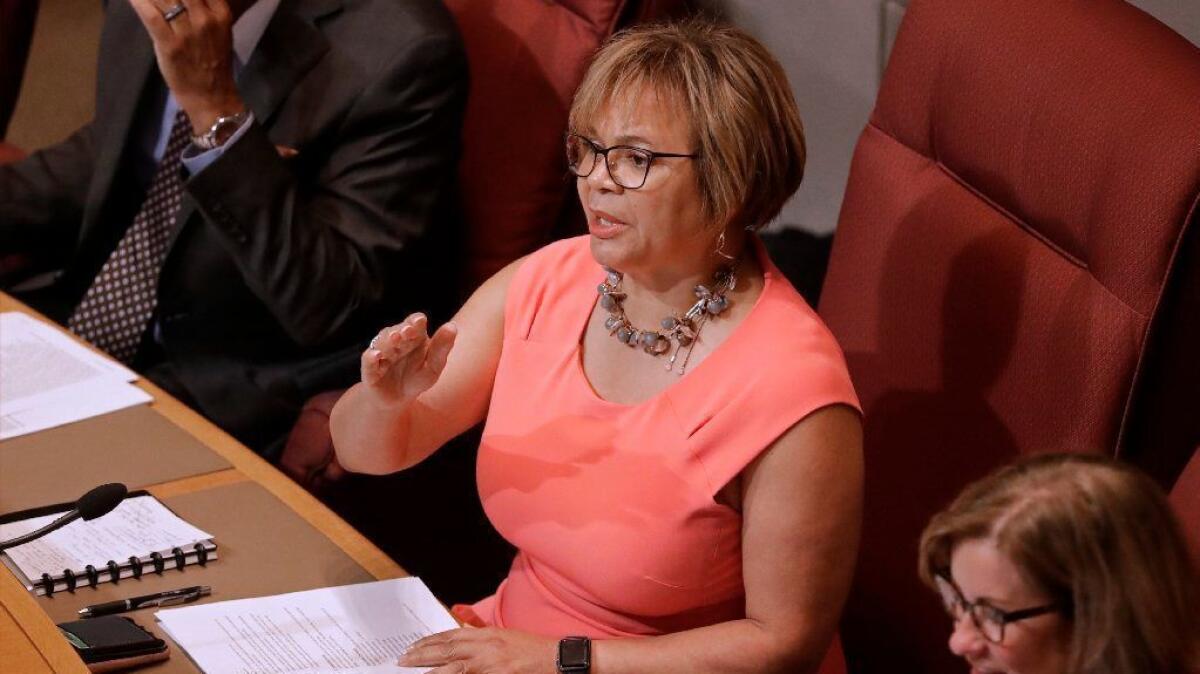Must Reads: 2020 Republican convention goes to Charlotte, the lonely and reluctant bidder in age of Trump

Reporting from charlotte, n.c. — As Americans fought in recent weeks over whether restaurants should refuse to serve top aides to President Trump, an entire city has been debating what it means to host his convention for reelection.
Charlotte won the rights to the 2020 Republican National Convention on Friday. But that’s largely because it faced little serious competition. And even before the victory was announced in Austin, Texas, this thriving, progressive urban island in the Trump-friendly South was suffering some buyer’s remorse.
Charlotte Mayor Vi Lyles, a Democrat, says the decision to host the convention was the hardest she has tackled — “not just as a mayor but as a mom and as a friend” to her community.
To quell anger from her constituents, she has vowed that she will not deliver a welcome speech, an extraordinary break from custom. Other local leaders are going further, promising to use the occasion to speak out against Trump.
“If it were Mitt Romney or damn near anybody besides Donald Trump,” the debate would have been “much less heated,” said Larken Egleston, a Democratic council member.
The Republican Party’s difficulty in finding a host for the 2020 convention speaks both to the nation’s polarization in the Trump era and to the diminishing support for Republicans in cities that have the capacity to manage large-scale events. Even in Republican-dominated states, big cities have grown more culturally diverse and Democratic, with many residents seeing themselves as targets of Trump’s anti-immigration measures, divisive racial rhetoric and social policy attacks.
Charlotte, a city where minorities are a majority, within a county that voted 62% for Hillary Clinton, is still nursing civic wounds from a police shooting of an African American man that provoked violent protests two years ago and a fight with the state government over its limits on LGBTQ rights, a law that invited corporate boycotts. Now, this growing city of glass bank towers, brick warehouses and construction cranes is bracing for another two years of culture wars and security fears — and the potential to be ground zero for anti-Trump protests in the summer of 2020.
Charlotte has long been eager to boost its national image, with civic leaders bemoaning that some outsiders still confuse it with Charleston, S.C., and Charlottesville, Va. Even as the city now has two professional sports teams and successfully served as host to the 2012 Democratic National Convention, boosters see the Republican convention as another trophy that would solidify its place on the map.
But as the selection process dragged on, it became increasingly clear that other major cities had taken a pass.
During a contentious city council hearing earlier this week, member Matt Newton, an opponent, complained that Charlotte led the competition “not because we stepped forward, but because everyone else stepped back.”
After Newton’s Democratic colleague Egleston cast what many perceived as the deciding vote to accept the convention, he faced an onslaught of angry emails and social media posts, along with threats of party primary challengers. Even so, Egleston said the city had to follow through after winning the competition or risk harming its reputation. After all, council members told the mayor earlier this year that she should submit a bid.
In retrospect, Egleston conceded, many council members failed to imagine that they might actually win the convention.
“If there was a time machine and people could go back and reconsider whether or not to bid, we might have said, ‘You know what, this is a highly charged time because of a president unlike any we’ve seen in our lifetimes,’ ” he said. “I can imagine people saying, ‘Let’s sit this one out and, you know, maybe we express an interest in 2024.’ ”
In the end, Egleston was among six members of the 11-member council who voted to hold the convention here — a squeaker that kept supporters in the city’s powerful business community anxious.
The 6-5 vote — on a council where Democrats have a 9-2 majority — cleared the way for Friday’s announcement by Republican leaders to formally award the bid.
By the time Republican officials made their choice, however, the only remaining competition came from Nevada’s Republican Party, whose bid came without support from the Las Vegas Convention and Visitors Authority or the city government. Other potential sites flamed out earlier, including San Antonio, which voted in May against bidding after public concerns that association with Trump would tarnish the predominantly Latino city’s image.
The RNC said five other cities expressed interest earlier in the year. But four of the five told the Charlotte Observer that they declined to submit bids, while officials in the fifth said they had no knowledge of any bid.
Two RNC officials, speaking on the condition of anonymity, said they used a quiet process to whittle down the competition, rather than solicit expensive bids and glitzy public presentations. Some cities lacked the necessary infrastructure or available convention space and were told not to bid, one official said.
Party officials said they felt that the Nevada bid was viable, despite Las Vegas officials’ opposition, given the clout of casino magnate Sheldon Adelson and other major Republican donors in the city’s hospitality industry.
Ron Kaufman, the chairman of the party’s site selection committee, pronounced himself thrilled with the choice of Charlotte. Yet he conceded the nation’s political divide had impacted the process.
“This is a very hard time in politics right now, across the board,” Kaufman said in an interview. “People are polarized.
“God help this country if there’s a point in time where either party couldn’t go to any city,” he added.
Kaufman recalled that Frank Jackson, the Democratic mayor of Cleveland who hosted the 2016 Republican convention, had been “one of my best sales people” in touting the economic and reputational benefits of hosting a convention.
But, in a sign of Trump’s impact on such debates, Jackson declined a request for an interview to discuss whether he would make the same calculation in the current climate.
In Charlotte, backers had scrambled in the final days, and slightly more than half of the nearly 100 speakers who lined the council chamber for Monday’s hearing supported bringing the convention here. Among them were hoteliers, car service owners and restaurateurs, who cited the city’s success with the 2012 Democratic convention and were eager to join a small group of cities that have hosted both parties’ quadrennial gatherings.
Many also talked about the need to demonstrate inclusiveness of diverse political opinions.
J. Sam Daniels, a wine bar owner and former Republican operative, noted that he supported the effort to win the Democratic convention in 2012 “because I knew it would be good for the city.”
“I ask that you do the same for me and my party,” he told the council.
Like other supporters, he did not wear a “Make America Great Again” hat, or even mention Trump. But opponents mentioned Trump repeatedly.
Some cited security concerns. There was also talk of Trump’s popularity with white nationalists, of his child separation policy at the border and of the need to resist “normalizing this hateful man” and keeping the “Trump train and its garbage” out of the city.
“It is time in this nation where we stand up to racism, where we stand up to bigotry, where we stand up to xenophobia,” said Ray McKinnon, who wore an “I can’t breathe” T-shirt, memorializing African American Eric Garner, who died in 2014 while being forcibly arrested by New York City police.
“Sometimes we have to take the courage to stand up to a bully,” said Naomi Brezi.
Council member Braxton Winston, who led protests after Keith Lamont Scott, an African American man, was shot by police here in 2016, responded to the argument for openness to Republicans by saying that he does not see Trump as a normal Republican.
“I see him as a human avatar of white supremacy,” he said from the dais before casting his “no” vote.
In an interview this week, Winston said he would nonetheless spend the next two years working to make the convention successful and ensuring that workers and lower-income people share the economic benefits, while protesters have an adequate platform.
“If anybody in this nation thinks that we’re not in a challenged time at best … or we’re at some kind of philosophical cold civil war among ourselves at the very worst,” he said, “I think you’re living under a rock.”
Follow the latest news of the Trump administration on Essential Washington »
[email protected] | Twitter: @noahbierman
UPDATES:
10 a.m.: This article was updated to reflect the Republican National Committee’s decision officially picking Charlotte, N.C.
This article was originally published at 8:35 a.m.
More to Read
Get the L.A. Times Politics newsletter
Deeply reported insights into legislation, politics and policy from Sacramento, Washington and beyond. In your inbox three times per week.
You may occasionally receive promotional content from the Los Angeles Times.











